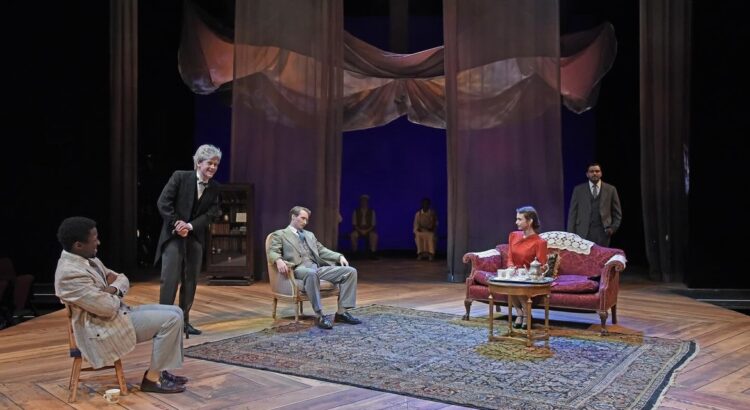Nothing screams “Chekhov” like a three-hour play about family drama—and The Cherry Orchard is full of it.
The Department of Theater and Drama recently wrapped up its two-week run of The Cherry Orchard, directed by Associate Professor Daniel Cantor.
The play is about a 20th-century Russian aristocratic family facing financial ruin and losing their ancestral estate, including its titular cherry orchard. Matriarch Luibóv Ranyévska and her brother Leoníd Gáyev own the estate from their youth and have fond memories of the property. Ranyévska has two children, the free-spirited Ánya and the careful Várya. Two neighborly businessmen (Borís Semyónov-Pishik and Yermolái Lopákhin) are attempting to convince the family to cut down their beloved cherry orchard for land to maintain the finances to keep their estate. The family does not take to their counsel, tumbling into the inevitable fate of the property. The play explores the turn-of-the-century social and economic transitions in the waning aristocratic era of Russia within a little family out in the country.
The original 1903 book was written in Russian by Anton Chekhov (Вишнёвый сад), so the production was performed from an English translation. I’m not sure I was particularly fond of the translation—at times, the dialogue felt watered down from the complexity and nuance I know from Chekhov’s careful character-building.
An air of nostalgia cut through the direction quite masterfully. I felt sentimental with Ms. Ranyévska and her brother Mr. Gáyev, the estate’s owners, however, the predictable fate of the home and relationships between the family and businessmen were not as intriguing to me. I craved more of a ping-pong-like drama between the businessmen and the family, leaving the plot a little flat. The drama perhaps could have gotten lost because of the aforementioned translation or the length of the nearly three-hour endeavor to arrive at the fate of their beloved estate.
The movement and musical aspects of this play caught my attention significantly. Music & Live Sound Coordination (perhaps arranged or written?) was by Hayden Steiner and Raymond Ocasio. There was a small band that performed on-stage with the actors. I loved the soundscape and chosen instrumentation for the show—some solo moments, such as a clarinet to represent youth, and a single violin for perhaps a more sentimental yearning for the past. There were larger arrangements, for example during Ms.Ranyévska’s party held at the estate with the band in all-white clown costumes (not sure what this was referencing, if anything). Choreography and movement was handled by Drey’von Simmons, a first-year musical theater student. I thought the movement created interesting stage pictures and was thoughtfully placed in the show.
Though I struggled with the lack of motivation in the plot, the performances by the actors were overwhelmingly good. Luibóv Ranyévska was played by a stunning Kaylin Gines alongside her brother Leoníd Gáyev as Jaylen Steudle. These two captivated my attention constantly—they deeply embodied the lack of acceptance from their declining fortunes and especially from Gines, an inability to embrace change. They playfully managed their character’s see-sawing emotions from euphoria to deep anguish. I equally enjoyed the disheveled butler, Firs (Sam Hopkins). Firs is an elderly servant who represents the fading aristocratic era, and while devoted to the family, is left behind at the end, tragically forgotten in the chaos of the family’s departure. Hopkins (an apparent college student) nailed the physicality of someone three to four times his age—physically and vocally. I enjoyed his sentimental presence, and I thought a profound way to end the play with his death in the empty house.
April 13th, 8pm. Arthur Miller Theater. Images thanks to @umichtheatre on Instagram.




